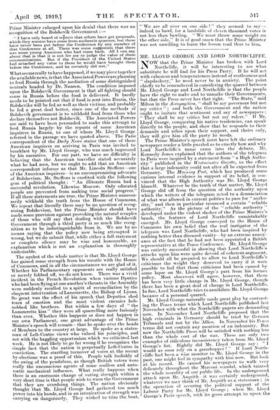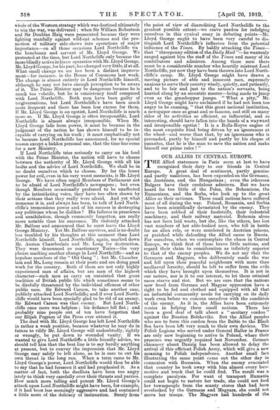MR. LLOYD GEORGE AND LORD NORTHCLIFFE.
NOW that the Prime Minister has broken with Lord Northcliffe, it will be interesting to see what substitute he will find for his Press Party. If he will act with calmness and temperateness instead of restlessness and
" slapdashery," he need never be in anxiety. The point chiefly to be remembered in considering the quarrel between Mr. Lloyd George and Lord Northcliffe is that the people
have the right to make and to unmake their Governments, but that the Press never has that right. "The State," said Milton in the Areopagitiect," shall be my governors but not my critics " ; and both the Government and the nation ought to imitate that sentiment and say of newspapers : " They shall be my critics but not my rulers." If Mr. Lloyd George, conquering his native tendencies, can speak directly to the people, and show that he responds to their demands and relies upon their support, and theirs only, they will give him all the party he needs.
The Prime Minister's speech must have left the ordinary newspaper reader a little puzzled as to exactly how and why Lord Northcliffe's name came into the debate. Mr. Kennedy Jones explained that the authors of the telegram to Paris were inspired by a statement from " a High Autho- rity" published in the Westminster Gazette, to the effect that a large indemnity could not after all be expected from Germany. The Morning Post, which has produced some curious internal evidence in support of its belief, is' con- vinced that the High Authority was Mr. Lloyd George himself. Whatever be the truth of that matter, Mr. Lloyd George slid off from the question of the authority upon which the writers of the telegram acted to a denunciation of what was allowed in current politics to pass for " autho- rity," and then in particular trounced a certain " reliable authority." As the picture of the " reliable authority " developed under the violent slashes of the Prime Minister's brush, the features of Lord Northcliffe unmistakably emerged. Mr. Lloyd George conveyed to the House of Commons his own belief that the real instigator of time telegram was Lord Northcliffe, who had been inspired by nothing better than diseased vanity—by an extreme annoy- ance at the fact that he had not been appointed a British representative at the Peace Conference. Mr. Lloyd George was entirely successful in showing that Lord Northcliffe's attacks upon him were quite devoid of coherent argument. We should all be prepared to allow to Lord Northcliffe's criticisms the weight they deserved to carry if it were possible to feel that those criticisms had been caused by some lapse on Mr. Lloyd George's part from his former policy. Most observers will agree, however, that there has been very little change in Mr. Lloyd George, though there has been a great deal of change in Lord Northcliffe. In fine, Lord Northcliffe tries to annihilate Mr. Lloyd George because of a personal quarrel.
Mr. Lloyd George naturally made great play by contrast- ing the Peace terms which Lord Northcliffe published last November with what the Northcliffe papers are demanding now. In November Lord Northcliffe proposed that the high criminals in Germany should be tried by German Tribunals and not by the Allies. In November his Race terms did not contain any mention of an indemnity. But now the Northcliffe Press will he satisfied with nothing less than the whole cost of the war. These are only two examples of ridiculous inconsistency taken from Mr. Lloyd George's list. Rightly did Mr. Lloyd George say : I would as soon rely on a grasshopper ! " If Lord North- cliffe had been a wise monitor to Mr. Lloyd George in the past, one might feel in sympathy with him now. But look at his record. He caused his newspapers to walk very delicately throughout the Marconi scandal, which tainted the whole morality of our public life. In the underground attack upon Mr. Asquith—it was certainly underground, whatever we may think of Mr. -Asquith as a statesman ; in the operation of securing the political support of the Labour Party for Mr. Lloyd George ; when Mr. Lloyd George's Paris speech, with its gross attempt to upset the whole of, the Western strategy which was destined ultimately to win the.war, was delivered ; when Sir William Robertson and Sir Doubles Haig were persecuted because they were fighting manfully against wild-cat schemes and the pro- motion of military side-shows into operations of major importance on all those occasions Lord Northcliffe we the henchman and servant of Mr. Lloyd George. We protested at the time, but Lord Northcliffe only became the more blindly active in hisco operation with Mr. Lloyd George. Mr. Lloyd George, for his part, has changed very little, if at all. What small change we see has been a distinct improve- ment—for instance, in the House of Commons last week. The change is almost entirely in Lord Northcliffe himself, although he may not have enough perception to be aware of it. The Prime Minister may be dangerous because he is much too volatile, but he is consistency itself compared with Lord Northcliffe. Both men have been guilty of tergiversations, but Lord Northcliffe's have been much more frequent and there has been less excuse for them. If Mr. Lloyd George is an egotist, Lord Northcliffe is much more so. If Mr. Lloyd George is often irresponsible, Lord Northcliffe is almost always irresponsible. When Mr. Lloyd George falls from power, it must be because in the judgment of the nation he 'has shown himself to be in- capable of carrying on his work ; it must emphatically not be because Lord Northcliffe has announced, for no special reason except a hidden personal one, that the time has come for a new Ministry.
If Lord Northcliffe tries seriously to carry on his feud with the Prime Minister, the nation will have to choose between the authority of Mr. Lloyd George with all his faults and the advice of Lord Northcliffe. We shall be in no doubt ourselves. which to choose. By far the lesser power for evil, even in his very worst moments, is Mr. Lloyd George. We have often urged Members of Parliament not to be afraid. of Lord Northcliffe's newspapers ; but even though Members occasionally professed to be unaffected by the intimidating voice, they have too often shown by their actions that they really were afraid. And yet what nonsense it is, and always has been, to talk of Lord North- cliffe's tremendous power and of his success in destroying any politician whom he dislikes p His failures in prescience and annihilation, though commonly forgotten, are really more notable than his successes. He violently attacked Mr. Balfour and announced that he must leave the Lloyd George Ministry. Yet Mr. Balfour survives, and is no doubt less troubled by his thoughts at this moment than Lord Northcliffe himself. Lord Northcliffe, again, marked down Mr. Austen Chamberlain and Mr. Long for destruction. They were denounced as reactionary Tories—the very phrase marking another change in Lord Northcliffe—and as hopeless members of the " Old Gang " ; but Mr. Chamber lain and Mr. Long remain at their posts and are doing good work for the country. Both of them are not only highly experienced men of affairs, but are men of the highest character—such men as carry on untainted that great tradition of British public life which sometimes seems to be direfully threatened by the individual offences of other public men. Sir Edward Carson, to take another case, publicly attacked Lord Northcliffe; and if ever Lord North- cliffe would have been specially glad to be rid of an enemy, Sir Edward Carson was that enemy. But Lord North- cliffe once more was helpless ; his defiance fell flat ; and probably nine people out of ten have forgotten that our Elijah Pogram of the Press ever uttered it. The duel with Mr. Lloyd George has left Lord Northcliffe in rather a weak position, because whatever he may do in future to vilify Mr. Lloyd George will undoubtedly, rightly ox wrongly, be put down to wounded vanity. If we wanted to give Lord Northcliffe a little friendly advice, we should tell him that the best line is to say hardly anything at present, but to convey the impression that Mr. Lloyd George may safely be left alone, as he is sure to cut his own throat in the long run. When a term came to Mr. Lloyd George's power, Lord Northcliffe would then be able to say that he had foreseen it and had prophesied it. As a matter .of fact, both the duellists have been too angry lately to think very carefully over their thrusts and parries. How flinch more telling and potent Mr. Lloyd George's attack upon Lord Northcliffe might have been, for example, if it had been leas seemingly aggressive and had contained a little more of the delicacy of insinuation. Surely from the point of view of discrediting Lord Northcliffe to the greatest possible extent—we crave pardon for indulging ourselves in this cynical essay in debating points—Mr. Lloyd George ought to have been very careful to dis- tinguish Lord Northcliffe's influence from the potential influence of the Times. By baldly attacking the Times— that " threepenny edition of the Daily Mail "—he wantonly ranged against him the staff of the Times and many of its contributors and admirers. Among these men there must be a considerable number who heartily mistrust Lord Northcliffe, yet now they have been thrown into Lord North- cliffe's camp. Mr. Lloyd. George might have drawn a moving picture of able and innocent men, supremely anxious to serve their country wisely, quietly, and patiently, and to be fair and just to the nation's servants, being hurried along by an eccentric master—being made to jump even as the grasshopper jumps. " What a pity," Mr. Lloyd George might have exclaimed if he had not been too angry to be cunning, " that this great national institution, a newspaper once so great and so famous, and still on many sides of its activities so efficient, so influential, and so interesting, should have fallen into the hands of a wayward and irresponsible egotist ! It is a Rolls-Royce engine of the most exquisite kind being driven by an ignoramus at the wheel—and worse than that, by an ignoramus who is persuaded, partly by himself and partly by his claque of parasites, that he is the man to save the nation and make himself our prime ruler 1 "







































 Previous page
Previous page